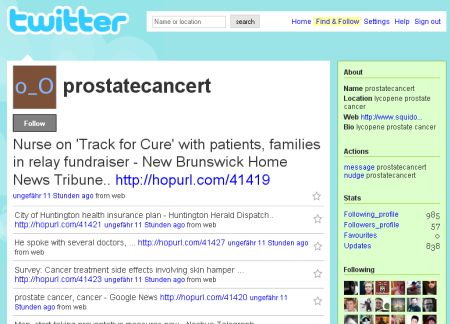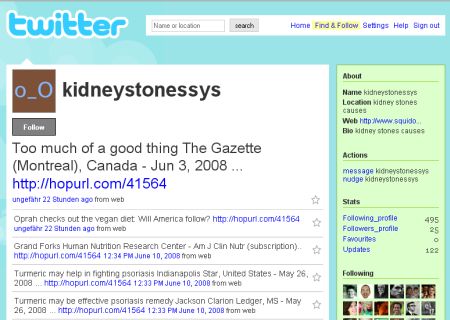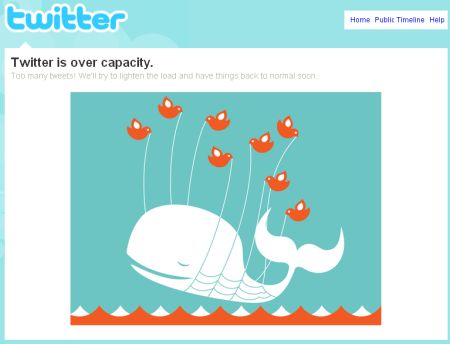von Roland Hachmann | Mrz 20, 2009 | Blog, Digital Culture, Marketing Trends, Social Media Marketing
People learning English have the possibility to receive „One Word a Day“ via email in order to improve their vocabulary.
The word of today is funny, I wouldn’t have thought that it makes its way into regular vocabulary so fast:
Your word for 20th March 2009 is
* * * twittering * * *
Please choose the correct definition and click the link.
a) whistling or humming the same tune over and over
http://www.owad.de/check.php4?id=2260&choice=1&sid=1181682
b) sending short electronic texts to let people know what you are doing
http://www.owad.de/check.php4?id=2260&choice=3&sid=1181682
c) nervously tapping the foot or leg as a sign of impatience
http://www.owad.de/check.php4?id=2260&choice=5&sid=1181682
Happy guessing!
So what do you think it is? 😉
von Roland Hachmann | Aug 2, 2008 | Blog, Digital Culture, Digital Marketing, Marketing, Marketing Trends, Mobile Marketing, Social Media Marketing
A really extensive list of brands utilizing twitter can be found at this location, called the twitter brand index. A lot more, than I thought, and a lot more US-focused (for obvious reasons) than I would have liked.
This at least solves the question: is twitter already relevant for marketing? It does not yet solve the question: is it effective for marketing? But that question will probably only be answered much later, once the user base of twitter has reached a critical mass.
von Roland Hachmann | Jul 4, 2008 | Blog, Digital Culture, Digital Marketing, Marketing, Social Media Marketing
In discussions and social media workshops with clients there is always the one question looming: shall we hop on to existing networks or shall we build our own, new social network? A brand centric or at rather: brand-fan centric social network. Of course it’ll have all the feats like uploading content, connecting with other brand-fans, sharing, communicating, etc. Why not, there seem to be a lot of brand-fans out there!
This can be a good idea depending on your objectives. But on the other hand, there are quite a few reasons, why you might want to leverage existing networks. Be it social network platforms like facebook and myspace, content networks like youtube and flickr or loose networks like blogs.
It has got to do something with the old questions:
- what’s the use of being the first in a new network (the first fax machine ever wasn’t really useful, was it?)
- how sticky are the networks, that users have already established elsewhere? Will they go through the effort of establishing yet another network?
The reason I started thinking about this is the current post about identi.ca vs twitter on techcrunch. Twitter is the most popular mobile microblogging service out there, no doubt about it. But the fact, that it has experienced a lot of downtime lately (and „failwhale“ becoming regular geek speak) has put off many people lately.
identi.ca offers a rationally better solution to this problem (even though it wouldn’t have had enough traffic yet to prove it). Its openness let’s you assume, that in the long term, it will be the more reliable service. But still, people seem to be reluctant to move over there. That’s what techcrunch is writing about: the problem with identi.ca is, that it is not twitter.
Twitter is not huge yet, most people won’t even have heard about it sofar. But its user-base is strong enough for everyone to stick with it, hope that the technical problems will cease to happen once they have gotten their infrastructure right with all the VC capital they got…
So if a well functioning network service can’t lure people from a failing one, how are brands expecting to launch completely new network services out of nothing? Why should people start spending their time on the social network site of „FMCG brand X“ and go through all the effort finding and contacting new or old friends (again)?
There might be some brands/products with such a strong fan base or such a strong communicative idea, that they can start building their fan community on their own networking site. For all others, I would probably recommend leveraging existing networking sites. At least to begin with.
von Roland Hachmann | Jun 12, 2008 | Blog, Digital Marketing, Marketing, Marketing Trends, Online Advertising, Social Media Marketing
I was going to comment on Pete Blackshaws Post „Twitter Spam„, but unfortunately, the long and complex typekey registration process put me off. So I will comment here and trackback, why not. And I can even add my own screenshots.
In his post, Pete suspects twitter now having spam profiles. I second that, I have a Chinese Hotel,a kidney stones and a prostrate cancer follower. Seems like twitter is slowly becoming a playing field of professional spammers, too.



von Roland Hachmann | Mai 28, 2008 | Blog, Digital Culture, Mobile Marketing, Social Media Marketing
Twitter has had quite a few technical problems lately. Some people take it the humorous way, some even programmed a website where you can check whether twitter is down or not. (reminds me of isitchristmas.com some people have way too much time…)
Twitter has become very popular. More than one million people are tweeting, some are updating their status many times a day. Many people have started using it as an instant messaging tool at the same time. Works fine, and you can even use it seamlessly on the go, on your mobile phone.
But since twitter started having their problems more frequently, people have started to complain. Of course it’s a bummer, if you can’t update your status (even though I can happily pass on quite a few of the statusses some people publish all the time). And it’s even worse if you’re depending on the IM feature of twitter. But heck, if you need a better IM tool, get skype, msn, icq or any of those!
So far, twitter does not take any money for their services, nor is there any advertising financing it. I really do wonder how they make their money? Is it just with the inbound SMS messages? Do they actually include a margin on top of what you need to pay for SMS anyway? I wouldn’t know, because I am sending my twitter SMS from Germany to the UK (where the only twitter number in Europe is available) and I wouldn’t know how much regular SMS would cost in contrast to the twitter SMS.
My question is: can/should you really complain so loudely about the failures of a free service? If their business model was already advertising financed, or if they would charge for their services, I could understand all those people complaining.
But this way, I think people should rather use and enjoy it, while it works, and if it doesn’t, be patient. In Germany, we have an expression saying: „einem geschenkten Gaul schaut man nicht ins Maul“. (Means, basically: if someone gives you a horse as a present, don’t bother checking for its health.)
PS: as I write this, twitter is down once again.






 Wo ich sonst so bin...
Wo ich sonst so bin...